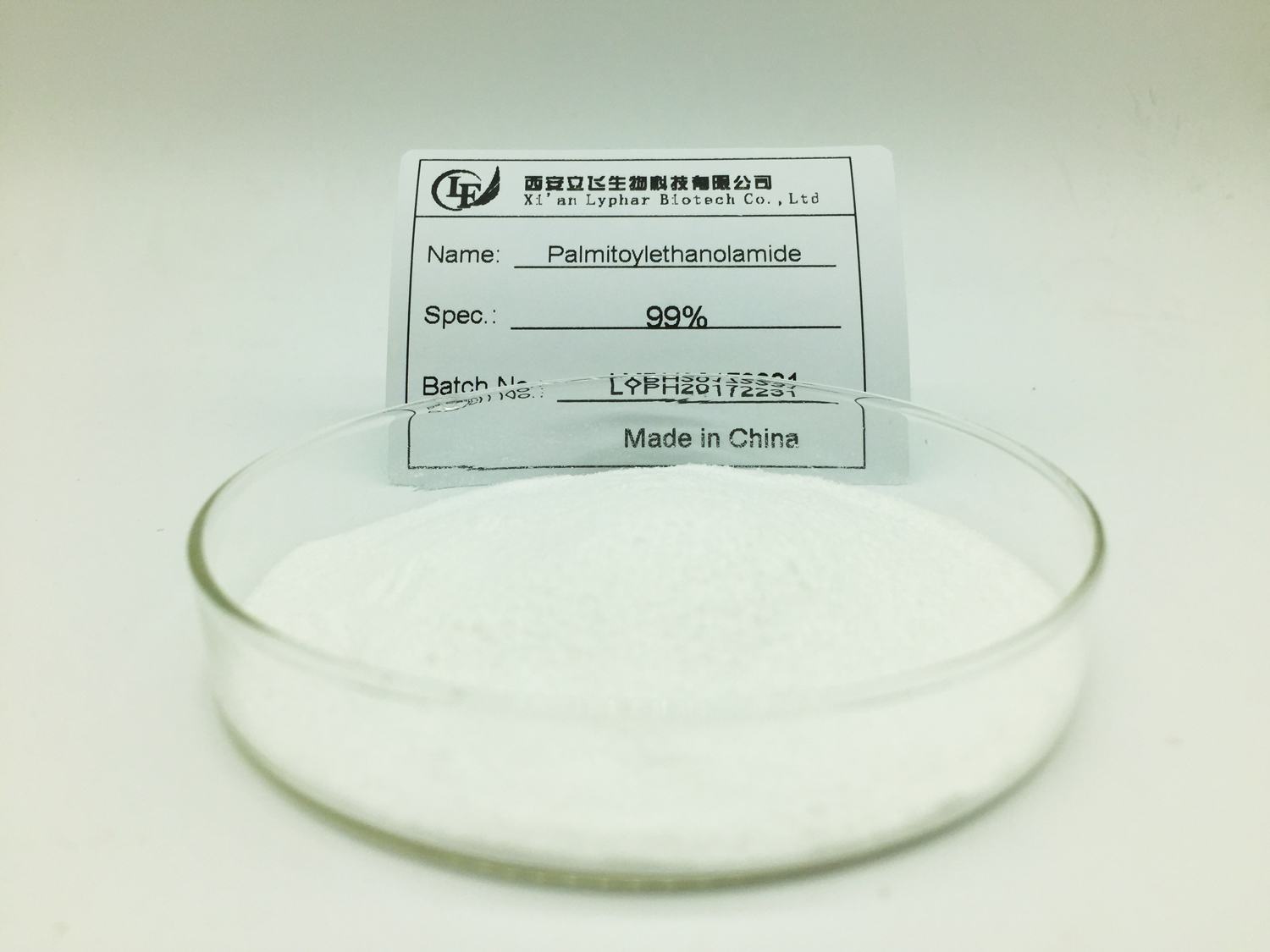Palmitoylethanolamide (PEA) is a naturally occurring fatty acid amide found in various tissues throughout the body, including the nervous system. It has gained attention for its potential therapeutic effects, particularly in the realm of pain management and inflammation. Here are some key points regarding the efficacy and effects of palmitoylethanolamide:
Anti-Inflammatory Effects: Palmitoylethanolamide is known for its anti-inflammatory properties. It can modulate immune responses and reduce the release of pro-inflammatory substances, which may help in managing various inflammatory conditions, such as chronic pain, neuroinflammation, and autoimmune diseases.
Pain Management: Palmitoylethanolamide has been extensively studied for its ability to alleviate various types of pain, including neuropathic pain, chronic pain, and inflammatory pain. It does so by targeting various pain pathways and receptors, which can help reduce pain perception.
Neuroprotection: Palmitoylethanolamide has neuroprotective properties that may be beneficial in neurodegenerative conditions like Parkinson’s disease and Alzheimer’s disease. It can help protect nerve cells from damage and reduce neuroinflammation, potentially slowing down disease progression.
Immune Modulation: Palmitoylethanolamide can modulate the immune system, helping to balance the immune response. This can be particularly useful in conditions where an overactive or dysregulated immune system is causing problems.

Potential for Nerve Health: Some studies suggest that Palmitoylethanolamide might promote the health of nerve cells and support their regeneration, making it a potential treatment for various neurological conditions and injuries.
Safety: Palmitoylethanolamide is generally well-tolerated and has a low risk of side effects. It’s considered safe for most people, although it’s always a good idea to consult with a healthcare professional before starting any new supplement or treatment.
Clinical Use: Palmitoylethanolamide is available in various formulations, including capsules and topical creams. It’s often used as a dietary supplement or complementary therapy in the management of chronic pain and inflammatory conditions.
Research Status: While there is a substantial amount of preclinical and clinical research supporting the potential benefits of Palmitoylethanolamide, more studies are needed to fully understand its mechanisms of action and its effectiveness for specific conditions.
It’s important to note that individual responses to Palmitoylethanolamide can vary, and it may not be a standalone treatment for all conditions. If you’re considering using Palmitoylethanolamide for a specific health concern, it’s advisable to consult with a healthcare professional to determine its appropriateness and the optimal dosage for your situation. Additionally, research on Palmitoylethanolamide is ongoing, so it’s essential to stay updated on the latest findings in the field.
Adverse effects of Palmitoylethanolamide
Palmitoylethanolamide (PEA) is a naturally occurring fatty acid amide that has been investigated for its potential therapeutic benefits, particularly in pain management and inflammation. While it is generally considered safe, there can be some adverse effects associated with its use. It’s important to note that individual responses to Palmitoylethanolamide can vary, and not everyone will experience these effects. Some potential adverse effects of Palmitoylethanolamide may include:
Gastrointestinal Disturbances: Some individuals may experience mild gastrointestinal issues such as nausea, diarrhea, or stomach discomfort. These effects are generally mild and transient.
Allergic Reactions: In rare cases, people may experience allergic reactions to Palmitoylethanolamide. Signs of an allergic reaction may include hives, itching, swelling of the face or throat, difficulty breathing, or a rash. If you experience these symptoms, seek medical attention immediately.
Drowsiness: Palmitoylethanolamide may cause drowsiness in some individuals. If you experience this side effect, it’s important to avoid activities that require alertness, such as driving or operating heavy machinery.
Interactions with Medications:Palmitoylethanolamide may interact with certain medications, especially those that affect the endocannabinoid system. It’s important to consult with a healthcare professional if you are taking any medications, especially ones that affect neurotransmitters or inflammation, to ensure there are no harmful interactions.

Hormonal Changes: Some research suggests that Palmitoylethanolamide may have an impact on hormone levels, although the significance of these effects is not well understood. If you have concerns about hormone-related issues, it’s advisable to discuss Palmitoylethanolamide with a healthcare provider.
Skin Irritation: In topical formulations, there have been rare reports of skin irritation or itching. If you experience skin discomfort or a rash after applying a Palmitoylethanolamide cream or ointment, discontinue use and consult a healthcare professional.
Headache: Some individuals have reported mild headaches as a side effect of Palmitoylethanolamide. If you experience persistent or severe headaches, consult a healthcare provider.
It’s essential to consult with a healthcare professional before using Palmitoylethanolamide or any dietary supplement, especially if you have underlying health conditions or are taking other medications. While Palmitoylethanolamide has shown promise in some studies for its anti-inflammatory and pain-relieving properties, its long-term safety and efficacy are still being studied, and individual responses can vary. If you experience severe or persistent adverse effects, discontinue use and seek medical advice.
